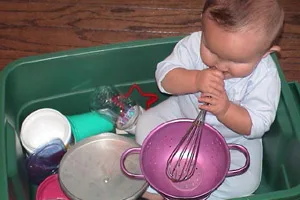Incidental Learning Opportunities for Children Who Are Blind or Low Vision
Children with blindness or low vision experience the world differently than their sighted peers, but they can thrive with intentional learning opportunities and hands-on experiences. Incidental learning, unintentional learning occurring as children observe tasks and activities, is less accessible to children with blindness or low vision. They may need additional support to gain similar insights. With purposeful engagement and creativity, everyday routines can become meaningful learning moments that spark curiosity and promote understanding.
What Is Incidental Learning, and Why Is It Different for Children with Low Vision?

Incidental learning refers to knowledge gained by observing surroundings and imitating others. For children who are blind or low vision, incidental learning doesn’t happen in the same way. They may miss out on key information without the ability to see how others interact with their environment. This means that parents, caregivers, and educators need to step in and provide explanations, descriptions, and experiences that allow children to explore concepts firsthand.
For example, when you walk into a room, you might instantly see who is there, what they’re doing, and even whether it’s sunny or rainy outside. A child who doesn’t have typical vision won’t gather this information automatically and may need additional verbal cues or physical interactions to understand their surroundings.
Creating Hands-On Learning Experiences
One effective way for children who are blind or low vision to build accurate ideas about the world is by experiencing it directly. Here’s how to make everyday moments educational and meaningful:
Involve Your Child in Daily Activities
Engage your child in household tasks to teach them about processes and materials. For example:
- When heating a bottle, let your child feel the cold air from the fridge, hear the microwave beep, and touch the warm bottle using hand under hand.
- During grocery shopping, involve your child in picking out fruits and vegetables. Let them feel the textures and shapes, smell the produce, and discuss how you will prepare them. Share how you touch some fruits and vegetables to determine if they are ripe and ready to enjoy.
- Make shopping meaningful. For a child with low vision, consider using pretend food or pictures to represent their shopping list. A child with blindness may find more success with tactile cards or braille lists.
Busy parents don’t need to set aside special time to create learning moments. Everyday routines like mealtime, bath time, and playtime can be rich with opportunities:
- Mealtime: Let your child help prepare simple dishes. For example, they can peel an orange, mix batter, or set the table.
- Bath time: Teach concepts like “full” and “empty” or discuss the sensations of water being warm or cold, fast or slow.
- Playtime: Use toys with different textures, sounds, or movements to introduce vocabulary and concepts like “soft,” “bumpy,” or “spinning.”
Providing Plenty of Time and Fun
Young learners need time to fully explore and understand their surroundings. Rushing them through tasks can hinder their ability to process and retain information and truly take in new concepts. Be patient, allow their hands and fingers to linger on objects, and take in sounds, smells, and even taste as they connect with their environment.
Making activities fun is equally important. Add joy to learning by singing songs, creating rhymes, or being playful. For example, when exploring a tree, you can sing, “This is the bark, rough and brown—it’s what holds the tree down!”
Combine sensory exploration with storytelling. For instance, create a tactile story about a lion while your child feels a toy lion’s fur, paws, and mane. Use descriptive language like “soft fur” and “sharp claws” to make the story come alive.
Exploring Beyond the Home
Taking your child to new places expands their understanding of the world. Consider outings to:
- Petting zoos where your child can touch and interact with animals.
- Science museums with tactile exhibits.
- Botanical gardens to explore different plant textures and smells.
Don’t hesitate to ask for exceptions when visiting places where touching isn’t typically allowed. Many places are happy to accommodate learning opportunities for children who are blind or have low vision.
Why Hands-On Learning Matters
Without real-world experiences, children with blindness or low vision may develop “empty language”—words without meaningful concepts attached to them. For example, a child might hear the word “ocean” but struggle to understand its vastness, sound, or salty scent without firsthand exposure. Providing rich, hands-on experiences ensures your child hears new words and builds accurate, meaningful connections. Be creative and create your own salty water at home.
Create an experience memory bag with your child after an adventurous outing. Include items like leaves, fabric swatches, or sand. Consider ways to bring in sounds or smells and have them describe each memory. This reinforces learning and allows your child to share their experiences and memories with others.
Fostering Curiosity and Confidence
Your child’s understanding of the world grows through intentional, hands-on exploration. By building learning moments into daily routines, creating time for thoughtful exploration, and making activities fun, you can help your child thrive.
Remember, it’s not about teaching 24/7—it’s about making the most of everyday experiences to spark curiosity and build a foundation of knowledge. With your support, your child will surprise you with how much they can learn and accomplish!